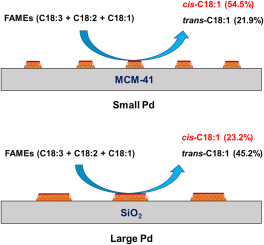当前位置:
X-MOL 学术
›
Fuel Process. Technol.
›
论文详情
Our official English website, www.x-mol.net, welcomes your
feedback! (Note: you will need to create a separate account there.)
Effect of Pd particle size on activity and cis-trans selectivity in partial hydrogenation of soybean oil-derived FAMEs over Pd/SiO2 catalysts
Fuel Processing Technology ( IF 7.2 ) Pub Date : 2020-06-01 , DOI: 10.1016/j.fuproc.2020.106393 Natthida Numwong , Panisa Prabnasak , Patsakol Prayoonpunratn , Pholawat Triphatthanaphong , Chachchaya Thunyaratchatanon , Takehisa Mochizuki , Shih-Yuan Chen , Apanee Luengnaruemitchai , Tawan Sooknoi
Fuel Processing Technology ( IF 7.2 ) Pub Date : 2020-06-01 , DOI: 10.1016/j.fuproc.2020.106393 Natthida Numwong , Panisa Prabnasak , Patsakol Prayoonpunratn , Pholawat Triphatthanaphong , Chachchaya Thunyaratchatanon , Takehisa Mochizuki , Shih-Yuan Chen , Apanee Luengnaruemitchai , Tawan Sooknoi

|
Abstract Partial hydrogenation of soybean oil-derived fatty acid methyl esters (FAMEs) was performed to improve oxidative stability of biodiesel. The reaction was tested in a semi-batch reactor at 100 °C, 0.4 MPa. The effect of Pd particle size on activity and cis-trans selectivity was investigated over SiO2- and MCM-41-supported Pd catalysts, with different Pd loadings (0.5 and 1 wt.%). For Pd/SiO2 catalysts with relatively large Pd particle sizes (6.1–7.8 nm), the adsorption of polyunsaturated C18:2 and C18:3 FAMEs was promoted on the flat metal surface, providing 2- to 3-fold higher turnover frequency (TOF) compared with Pd/MCM-41 catalysts. In contrast, the Pd/MCM-41 catalysts with relatively small Pd particle sizes (2.7–4.0 nm), showed higher selectivity towards the desired monounsaturated C18:1 FAMEs due to lower affinity of isolated double bond (presented in C18:1) on the Pd surface. In addition, selectivity towards the desired cis-C18:1 FAMEs was found to be highly sensitive to Pd particle size. The 0.5Pd/MCM-41 catalyst with small Pd particle size (2.7 nm), provided high cis-C18:1 selectivity, resulting in a biodiesel with better cold flow property compared with the trans-isomers. With partial hydrogenation over the prepared Pd catalysts, biodiesel with significantly improved oxidative stability (>10 h) could be obtained.
中文翻译:

Pd粒径对大豆油衍生FAMEs在Pd/SiO2催化剂部分加氢反应活性和顺反选择性的影响
摘要 对大豆油衍生的脂肪酸甲酯 (FAME) 进行部分加氢以提高生物柴油的氧化稳定性。该反应在半间歇式反应器中在 100 °C、0.4 MPa 下进行测试。在具有不同 Pd 负载量(0.5 和 1 wt.%)的 SiO2 和 MCM-41 负载的 Pd 催化剂上研究了 Pd 粒径对活性和顺反选择性的影响。对于 Pd 粒径相对较大(6.1-7.8 nm)的 Pd/SiO2 催化剂,多不饱和 C18:2 和 C18:3 FAME 在平坦金属表面上的吸附得到促进,提供 2 到 3 倍的周转频率(TOF) ) 与 Pd/MCM-41 催化剂相比。相比之下,Pd 粒径相对较小(2.7-4.0 nm)的 Pd/MCM-41 催化剂对所需的单不饱和 C18 表现出更高的选择性:1 FAMEs 由于孤立的双键(以 C18:1 表示)在 Pd 表面的亲和力较低。此外,发现对所需 cis-C18:1 FAME 的选择性对 Pd 粒径高度敏感。0.5Pd/MCM-41 催化剂具有小 Pd 粒径 (2.7 nm),提供高顺式-C18:1 选择性,导致生物柴油与反式异构体相比具有更好的冷流性能。通过在制备的 Pd 催化剂上部分加氢,可以获得具有显着改善的氧化稳定性(> 10 h)的生物柴油。与反式异构体相比,生物柴油具有更好的冷流性能。通过在制备的 Pd 催化剂上部分加氢,可以获得具有显着改善的氧化稳定性(> 10 h)的生物柴油。与反式异构体相比,生物柴油具有更好的冷流性能。通过在制备的 Pd 催化剂上部分加氢,可以获得具有显着改善的氧化稳定性(> 10 h)的生物柴油。
更新日期:2020-06-01
中文翻译:

Pd粒径对大豆油衍生FAMEs在Pd/SiO2催化剂部分加氢反应活性和顺反选择性的影响
摘要 对大豆油衍生的脂肪酸甲酯 (FAME) 进行部分加氢以提高生物柴油的氧化稳定性。该反应在半间歇式反应器中在 100 °C、0.4 MPa 下进行测试。在具有不同 Pd 负载量(0.5 和 1 wt.%)的 SiO2 和 MCM-41 负载的 Pd 催化剂上研究了 Pd 粒径对活性和顺反选择性的影响。对于 Pd 粒径相对较大(6.1-7.8 nm)的 Pd/SiO2 催化剂,多不饱和 C18:2 和 C18:3 FAME 在平坦金属表面上的吸附得到促进,提供 2 到 3 倍的周转频率(TOF) ) 与 Pd/MCM-41 催化剂相比。相比之下,Pd 粒径相对较小(2.7-4.0 nm)的 Pd/MCM-41 催化剂对所需的单不饱和 C18 表现出更高的选择性:1 FAMEs 由于孤立的双键(以 C18:1 表示)在 Pd 表面的亲和力较低。此外,发现对所需 cis-C18:1 FAME 的选择性对 Pd 粒径高度敏感。0.5Pd/MCM-41 催化剂具有小 Pd 粒径 (2.7 nm),提供高顺式-C18:1 选择性,导致生物柴油与反式异构体相比具有更好的冷流性能。通过在制备的 Pd 催化剂上部分加氢,可以获得具有显着改善的氧化稳定性(> 10 h)的生物柴油。与反式异构体相比,生物柴油具有更好的冷流性能。通过在制备的 Pd 催化剂上部分加氢,可以获得具有显着改善的氧化稳定性(> 10 h)的生物柴油。与反式异构体相比,生物柴油具有更好的冷流性能。通过在制备的 Pd 催化剂上部分加氢,可以获得具有显着改善的氧化稳定性(> 10 h)的生物柴油。











































 京公网安备 11010802027423号
京公网安备 11010802027423号